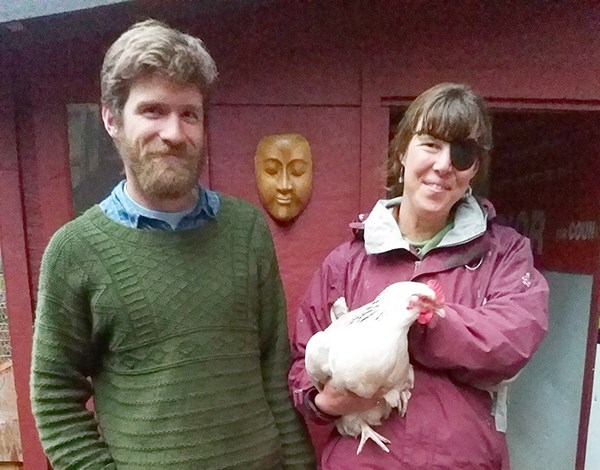Now that Squamish residents are allowed to keep hens, some are keen to do so – but they have questions.
Last year a hotly debated bylaw allowing for backyard hens in Squamish was passed, so recently, Squamish Climate Action Network (CAN) organized an evening with Duncan Martin to educate a small group on how best to keep hens. Martin is the designer and builder of Vancooper chicken coops and owner of the Daily Egg (www.thedailyegg.com).
Sitting around a large table in Councillor Ted Prior’s kitchen, Martin discussed everything from housing requirements (minimum of four-square-foot coop space and 10-square-foot enclosed run space), to the permitted number of hens (maximum of five females per parcel of land – and definitely no roosters), to bear-proofing your enclosure (electric fences are essential).
He also touched on nutrition. For example, in addition to nutrient-balanced mash or pellets, chicken scratch and any garden bugs they can get their beaks on, hens also enjoy almost all food scraps and are a great addition to any kitchen’s food cycle. However, you may want to avoid feeding them fish heads as the pungent aroma may transfer to your eggs.
Prior and a tenant, Carolyn Morris, who both attended the information session, are new to keeping hens and established their small flock just a couple of weeks ago. Although experts such as Martin are available to build coops, they chose to construct their own following district guidelines and using as much upcycled material and creativity as possible. Prior’s old election boards were used as lining.
After researching, they chose to purchase their hens locally from Emily Smallwood, whom Morris worked with while putting forward backyard hen proposals for the district. “It was really lovely to go back to Emily and hear the stories behind her hens,” said Morris. “She’s very wise, knowledgeable and a wonderful caretaker of the hens. It was also really great to have quite a selection of heritage breeds and to be able to choose which ones were right for this property.”
They opted for a large, one-year-old Light Sussex, two younger Production Reds and two (occasionally feisty) Ameraucanas.
Queen-e (the older of the five) is already reliably producing one egg a day and it tastes delicious, Morris said. “When you collect the eggs and see these beautiful hens, when you know their story, when you take care of them, it just tastes all the better.”
A fan of the zero-mile diet and keen producer of her own food, Morris explains, “Connecting with my food and being able to sustain myself is the passion driving this.”
So too is raising hens the right way. “Keeping hens is a wonderful opportunity for so many different reasons… though I feel very strongly that if you’re going to do it, it should be done right. We live in an area that’s surrounded by and interacts with wildlife, so you have to make sure the hens are raised so that they’re not wildlife attractants. Whether it’s having an electric fence around the perimeter or the storage of the food, all of those things are so important.”
Though building the coop involved a bit of time, she explains, the daily chores are minimal and are outweighed by the pleasure of keeping hens.
So far, things have been going smoothly, including re-educating a few four-legged friends onsite that chickens are not for chasing. “With the help of a water spray bottle, we quickly re-associated their barking and so it soon stopped,” she says.
Morris is an active member of Squamish CAN and explains that other workshops have included bee keeping, food production and food preservation.
To find out about future workshops and to take part in Squamish CAN projects such as the Mamquam Elementary School Edible Schoolyard or the monthly community potluck, join www.squamishCAN.net. For details on backyard hen bylaws visit http://squamish.ca/our-services/animal-control/urban-hens.



